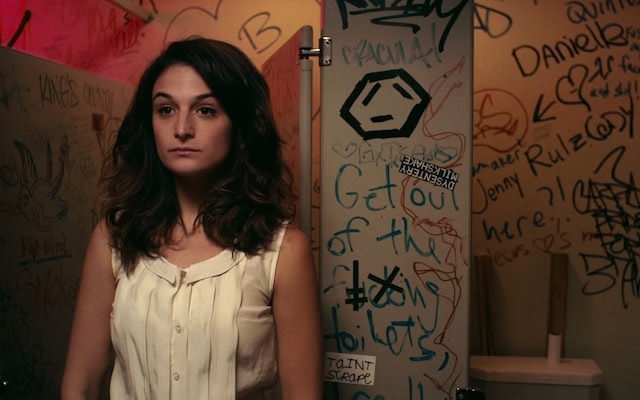
You can say it’s reductive to call “Obvious Child” an “abortion comedy,” and there’s certainly more to the film than that. It’s also a modern reshuffling of the romantic comedy, and a showcase for the talented Jenny Slate, a sweet-and-salty comic actress whose most prominent work to date has been a year on “SNL.”
But there’s no getting around the fact that “Obvious Child” is about a woman in her late 20s who gets pregnant after an ill-considered one-night stand and seeks an abortion — something that women in movies almost never do. The issue dominates American political discourse and is a major factor in people’s lives (25 percent of American women have had an abortion by age 30), yet it rarely gets more than a passing mention in entertainment apart from joking references and Very Special Episodes of TV dramas. Reductive or not, until abortion stops being unicorn-like in its scarceness in film, a movie that faces the subject head-on is going to be known as an “abortion comedy.”
(I say this, just as the movie does, without making any comment on the moral and ethical questions surrounding abortion. My point is simply that, regardless of whether it’s “right,” abortion is legal and common, and so its virtual absence in fictional entertainment is noteworthy.)
Written and directed by Gillian Robespierre, the film is an expansion of a short she and Slate made, and it retains the narrative simplicity and brief running time (even as a feature, it’s only 84 minutes long). Slate plays Donna Stern, a Brooklyn stand-up comedian whose onstage persona is that of a twinkly-eyed, potty-mouthed pixie who talks about sex and bodily functions, and giggles in a self-satisfied manner at her own filthiness. She’s new to the biz, still learning how to turn her personal crises into comedy gold. When she gets dumped by her boyfriend, she reacts with a fascinating train wreck of a drunken stand-up rant that’s full of pain, embarrassment, and the germs of several good jokes. (One of the things the movie is “about” besides abortion is a humorist’s creative process.)
Freshly dumped and on the verge of losing her day job at an indie bookstore, Donna gets more bad news: the rebound sex she had with a generically nice hunk named Max (Jake Lacy) has resulted in pregnancy. With support from her best girlfriend (Gaby Hoffman), who’s been around the abortion block a time or two herself, and from her requisite sassy gay friend (Gabe Liedman), Donna concludes that termination is her best choice. She has to wait two weeks, though, and come up with $500 — the sort of specifics that no non-documentary I’m aware of has ever addressed.
In the meantime, she continues to hone her stand-up act while fretting over whether to tell Max. He turns out to be a good guy with real potential, but having a child together is a terrible way to start a relationship. Donna also gets quippy advice from her father (Richard Kind) and has a tender scene with her mom (Polly Draper), whose support and love for her is heartwarming, perhaps the emotional anchor of the film.
The movie speaks of abortion frankly and without stigma. I hesitate to say it’s “positive” about it — nobody likes abortion — but it deals with characters who view it as an appropriate solution to a problem. The story’s conflict, then, isn’t about whether Donna should have one, but about how it reflects her status as a semi-mature, marginally employed twentysomething with a lot of growing up to do. The unplanned pregnancy is a wake-up call, one that Robespierre’s writing and direction handle with insight and sympathy.
The occupation of the main character and the casting of a comic actress in the lead suggest “Obvious Child” is a comedy, and that’s not inaccurate. But the humor is balanced with small dramatic beats that lend authentic emotion to the proceedings. Slate’s endearingly vulnerable performance is full of gusto whether Donna is cracking jokes or sobbing (or doing both simultaneously), keeping us grounded in reality so we don’t fly off into farce territory. If “Obvious Child” is any indication, she and Robespierre both have great careers ahead of them, hot-button topics or not.
B+ (1 hr., 24 min.; )
Originally published at About.com.





